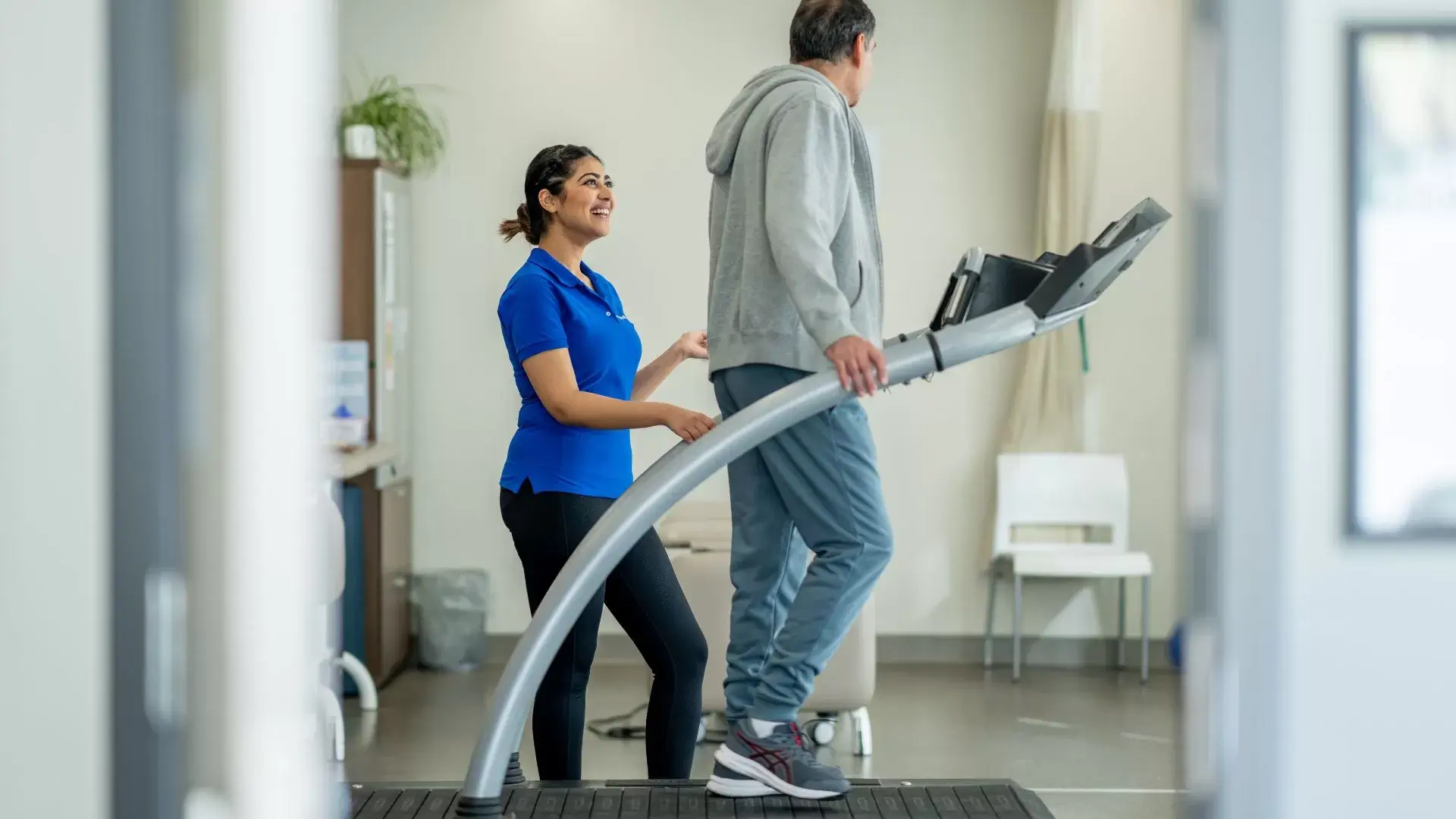In Mississauga, we recognize the critical importance of cardiopulmonary physiotherapy for those facing respiratory and cardiac challenges. Our specialized programs are tailored to improve lung function, enhance exercise tolerance, and support recovery from conditions like COPD or pulmonary hypertension. We utilize evidence-based techniques and extensive assessments to create personalized treatment plans, ensuring patient empowerment through education and support. By monitoring progress closely, we adjust regimens as necessary to promote safety and effectiveness. We’re dedicated to helping you reclaim your health and energy, and as you explore our services, you’ll uncover more about our all-encompassing approach to your well-being.

At Mississauga Physio Chiro Clinic, we offer an extensive range of physiotherapy and chiropractic services designed to support your recovery and enhance your overall well-being. Our focus on cardiopulmonary rehabilitation is particularly crucial for individuals experiencing exercise intolerance or compromised pulmonary function. We recognize that maintaining ideal cardiopulmonary function is essential for overall health, and our Expert Physiotherapist & Chirotherapist in Mississauga is dedicated to providing tailored treatment plans.
Through thorough cardiopulmonary assessments, we identify the unique needs of each patient, allowing us to create personalized cardiopulmonary therapy regimens. We utilize evidence-based techniques to aid in cardiopulmonary exercise, ensuring that our patients can gradually regain strength and endurance. Our clinic also emphasizes cardiopulmonary monitoring during rehabilitation, allowing us to track progress and make necessary adjustments to treatment protocols.
The cardiopulmonary system plays an essential role in sustaining our body’s oxygen supply and removing carbon dioxide, ensuring that both heart and lung functions operate efficiently. This intricate system comprises the heart, lungs, and blood vessels, working in harmony to maintain ideal cardiopulmonary health. Our heart-lung function is crucial for delivering oxygen-rich blood to tissues while facilitating the expulsion of waste gases.
When we undergo a cardiopulmonary function test, it helps evaluate significant metrics such as cardiac output, lung function, and oxygen saturation levels. By understanding these factors, we can gain insights into our overall health and identify areas for improvement.
Moreover, the respiratory system’s efficiency is critical; it allows for adequate gas exchange and supports our body’s metabolic needs. In situations where cardiopulmonary function is compromised, participating in a cardiopulmonary rehabilitation program can be invaluable. These programs focus on enhancing pulmonary function and promoting overall well-being, enabling us to regain strength and energy.
Understanding how cardiopulmonary function impacts our overall health leads us to explore effective physiotherapy solutions for common conditions affecting this essential system. Cardiopulmonary physiotherapy addresses a range of cardiopulmonary disorders, including dyspnea and breathlessness, which often arise from chronic conditions like congestive heart failure or respiratory failure.
We utilize various strategies to improve our patients’ quality of life. Oxygen therapy can greatly enhance oxygen delivery in those with compromised lung function, while endurance training is vital for building stamina and tolerance to physical activity. Incorporating spirometry into our assessments allows us to monitor lung function and tailor our interventions effectively.
For patients on mechanical ventilation, specialized physiotherapy techniques can aid in weaning off the device, ensuring a smoother shift to independent breathing. By focusing on these targeted interventions, we foster recovery and empower our patients to regain control over their respiratory health. Ultimately, our goal is to provide thorough support, equipping individuals with the tools they need to manage their conditions effectively and enhance their overall well-being.
Cardiopulmonary rehabilitation plays an essential role in recovery by providing structured support and tailored interventions that enhance physical function and overall well-being for individuals facing cardiopulmonary challenges. It serves as a cornerstone for improving cardiopulmonary fitness, particularly for those dealing with conditions like chronic obstructive pulmonary disease (COPD) and pulmonary hypertension.
Through extensive programs, we can address issues such as shortness of breath and fatigue, which often hinder daily activities. Cardiopulmonary exercise testing is a fundamental component of these programs, helping us identify individual capabilities and limitations, allowing for personalized exercise regimens. This targeted approach not only improves physical strength but also supports the cardiovascular system, promoting better heart health.
Moreover, cardiopulmonary support during rehabilitation can include ventilatory support when necessary, ensuring that our patients can safely engage in exercises designed to boost their overall cardiopulmonary wellness. By fostering a supportive environment, we can empower individuals to reclaim their lives, enhancing both their physical and emotional well-being. Ultimately, embracing cardiopulmonary rehabilitation is essential in guiding individuals towards a healthier and more active lifestyle.

How can we effectively enhance heart and lung health through targeted physiotherapy techniques? In our practice, we focus on cardiopulmonary physiotherapy to improve cardiopulmonary capacity and address issues related to cardiopulmonary dysfunction. One key approach involves tailored cardiopulmonary fitness training, which combines aerobic exercises with strength training to boost cardiopulmonary endurance. By doing so, we can enhance blood oxygen levels and overall aerobic capacity.
We also monitor the cardiopulmonary response during these exercises to guarantee that our patients are progressing safely. Techniques such as interval training can be particularly beneficial, as they help improve heart rate variability and promote better systemic circulation. Additionally, we incorporate breathing exercises to further support lung function and optimize oxygen intake.
Through a combination of these targeted techniques, we create personalized rehabilitation programs that empower individuals to regain their strength and improve their quality of life. Our empathetic approach recognizes the challenges faced by those with heart and lung conditions, and we work to instill confidence as they work towards their health goals. Together, we can foster significant improvements in heart and lung health, leading to a more active and fulfilling life.
Incorporating oxygen therapy into our cardiopulmonary physiotherapy practice can greatly enhance the effectiveness of our rehabilitation programs for patients with respiratory and cardiac conditions. By addressing hypoxia, we can markedly improve our patients’ oxygenation levels, which is essential for those suffering from conditions like COPD, asthma, bronchitis, and pulmonary fibrosis.
Utilizing oxygen therapy not only helps alleviate symptoms but also supports the body’s overall function, enabling it to combat cardiopulmonary complications. For instance, in patients with acute respiratory distress syndrome, oxygen therapy can be a fundamental component of their recovery strategy, aiding in the maintenance of adequate stroke volume and improving overall cardiovascular health.
As we implement oxygen therapy, we must remain mindful of individualized patient needs, ensuring that each person receives the appropriate dosage and method of delivery. This tailored approach fosters a more effective rehabilitation experience, allowing our patients to achieve better outcomes. By combining oxygen therapy with other physiotherapeutic techniques, we can empower our patients to regain their strength and improve their quality of life, steering through the challenges posed by their conditions with greater resilience and confidence.
Targeted exercise training is essential for enhancing cardiopulmonary fitness, allowing us to tailor rehabilitation programs that meet the unique needs of our patients. Through cardiopulmonary physiotherapy, we can address various cardiopulmonary diseases and improve overall cardiovascular health. By utilizing exercise prescription, we create individualized plans that focus on enhancing lung function and optimizing cardiopulmonary regulation.
In our sessions, we monitor cardiopulmonary symptoms closely, ensuring that each patient progresses safely and effectively. This targeted approach not only helps in alleviating symptoms but also promotes long-term health benefits, such as reduced hospitalizations and improved quality of life.
Our focus on pulmonary rehabilitation plays an important role in building endurance and strength, enabling patients to engage in daily activities with greater ease. We incorporate various modalities, including aerobic exercises and resistance training, to foster thorough improvement.
Ultimately, our goal is to empower patients through education and practical strategies that support their journey to better cardiopulmonary fitness. As we collaborate with each individual, we cultivate an environment of support and understanding, which is key for successful rehabilitation outcomes.
Building on our efforts to enhance cardiopulmonary fitness, we recognize the significant impact that breathlessness and dyspnea can have on our patients’ daily lives, and we employ specific physiotherapy approaches to alleviate these symptoms effectively. Breathlessness, often stemming from cardiopulmonary compromise due to conditions like cardiovascular disease or interstitial lung disease, can severely limit functional capacity and quality of life.
In our practice, we focus on tailored pulmonary rehabilitation programs that educate our patients about breathing techniques and energy conservation strategies. These approaches not only help manage dyspnea but also empower patients to take an active role in their recovery. Techniques such as pursed-lip breathing can improve ventilation and reduce feelings of hypercapnia, allowing patients to breathe more comfortably.
Additionally, we address underlying causes, such as lung infections, by coordinating with medical teams to guarantee thorough care. By integrating these physiotherapy interventions, we aim to minimize breathlessness, enhance exercise tolerance, and ultimately improve our patients’ overall well-being. Our commitment to understanding each patient’s unique challenges drives us to develop targeted strategies that make a real difference in their lives.

Effective assessments and ongoing monitoring are essential for tailoring cardiopulmonary physiotherapy interventions to meet each patient’s unique needs and track their progress over time. We begin with a detailed evaluation of cardiopulmonary circulation to understand how well the heart and lungs are functioning together. Utilizing tools like echocardiograms allows us to visualize cardiac structure and function, which is critical in diagnosing conditions such as coronary artery disease and cardiopulmonary insufficiency.
We also implement cardiopulmonary stress tests to assess cardiovascular resistance and identify limitations in physical capacity. Monitoring heart rate variability provides insights into autonomic function and overall cardiovascular health. By analyzing these metrics, we can develop personalized treatment plans that address specific impairments in cardiopulmonary interaction and reduce the risk of cardiopulmonary failure.
Through regular follow-ups and reassessments, we can track improvements and adjust our strategies accordingly. This approach not only helps us in managing symptoms but also empowers our patients to take an active role in their recovery journey, ultimately enhancing their quality of life. Our commitment to thorough assessments guarantees that each patient receives the most effective cardiopulmonary physiotherapy tailored to their needs.
Post-surgical cardiopulmonary recovery often necessitates an extensive rehabilitation strategy that addresses the unique challenges each patient faces during their healing process. In our approach, we focus on understanding cardiopulmonary physiology to tailor rehabilitation strategies effectively. Patients recovering from surgery may experience complications such as congestive heart failure (CHF), coronary artery disease (CAD), pneumonia, or acute respiratory distress syndrome (ARDS), all of which require careful management.
Our rehabilitation strategies include structured cardiovascular exercises to improve lung function and reduce vascular resistance, facilitating ideal oxygenation. We utilize techniques from cardiopulmonary physical therapy, emphasizing breathing exercises and mobilization to prevent complications and enhance recovery. Additionally, we educate patients about the importance of early intervention and signs of distress, which can be crucial for effective cardiopulmonary resuscitation if needed.
Addressing cardiopulmonary insufficiency requires a nuanced understanding of each patient’s unique physiological challenges, allowing us to implement specialized physiotherapy techniques tailored to enhance their recovery and overall quality of life. At our facility located at 1834 Lakeshore Rd W #6C, Mississauga, ON L5J 1J7, we focus on conditions such as cardiopulmonary arrest and cardiopulmonary shock, which necessitate immediate and effective interventions.
Our approach involves utilizing techniques that improve heart rate variability (HRV) and assist in managing interstitial lung disease (ILD). Through carefully designed exercise regimens, we can stimulate cardiovascular health and lung function, essential for those recovering from cardiopulmonary bypass procedures. By combining education and practical exercises, we empower patients to understand their conditions better and engage actively in their recovery journey.
In emergencies, our team is trained in CPR, ensuring we provide thorough care for patients in distress. We believe that through targeted physiotherapy, we can greatly improve clinical outcomes and enhance the quality of life for those battling significant cardiopulmonary challenges. For more information, you can reach us, where our dedicated staff is ready to assist.
We recognize that preventing respiratory complications is essential for patients recovering from various health challenges, and targeted physiotherapy interventions play an important role in this process. By employing evidence-based techniques, we can enhance lung function, improve airway clearance, and minimize the risk of infections.
One of the key strategies we utilize is the implementation of breathing exercises and techniques, which help patients optimize their ventilation and strengthen respiratory muscles. This not only promotes better oxygenation but also encourages patients to engage actively in their recovery. Additionally, we emphasize the importance of posture and positioning, as these factors can greatly influence lung capacity and secretion mobilization.
In our sessions, we conduct thorough assessments to tailor interventions to each patient’s specific needs. This individualized approach allows us to address any existing conditions while also preemptively mitigating potential complications. We also educate patients on the significance of adhering to their therapy routines, ensuring they understand the impact of their active participation.
Ultimately, through consistent and compassionate physiotherapy intervention, we empower our patients to take control of their recovery journey, considerably reducing the likelihood of respiratory complications and enhancing overall health outcomes.
Regularly incorporating lifestyle changes can greatly enhance cardiopulmonary health and wellness, offering patients a proactive approach to their recovery and overall well-being. We can start by focusing on diet; consuming a balanced diet rich in fruits, vegetables, whole grains, and lean proteins supports heart and lung function. We should also limit processed foods and sodium, which can lead to hypertension and other complications.
Physical activity is another cornerstone of improving cardiopulmonary health. Engaging in regular exercise—even simple activities like walking or stretching—can strengthen our respiratory and cardiovascular systems. It’s crucial to tailor our exercise routines to our individual capabilities, gradually increasing intensity as we build endurance.
Moreover, avoiding smoking and limiting exposure to secondhand smoke can greatly impact our lung health. We must also consider stress management techniques, as stress can exacerbate respiratory conditions. Activities like yoga and mindfulness can promote relaxation and improve overall well-being.
Embracing home-based cardiopulmonary physiotherapy programs offers patients a convenient and effective way to enhance their recovery while maintaining comfort and independence in their own environment. These programs allow us to tailor treatment plans specifically to individual needs, ensuring that we address unique challenges faced by each patient. By providing therapy in familiar surroundings, we foster a sense of security, which can greatly improve motivation and adherence to the prescribed regimen.
Moreover, home-based physiotherapy can reduce the stress and fatigue associated with traveling to clinics, making it easier for patients to engage consistently in their rehabilitation. We’re also able to incorporate family members into the process, creating a supportive network that encourages both emotional and physical wellness.
Another notable advantage is the flexibility in scheduling. This adaptability allows us to align therapy sessions with the patient’s daily routine, promoting a balance between recovery and personal commitments. Ultimately, home-based cardiopulmonary physiotherapy not only enhances physical health but also nurtures emotional well-being, as patients regain confidence and independence in their recovery journey.
In Mississauga, accessing expert cardiopulmonary physiotherapy can greatly enhance recovery outcomes for individuals facing respiratory and cardiac challenges. We recognize that maneuvering through these health issues can be intimidating, and having skilled professionals by our side makes a significant difference.
When we seek out specialized physiotherapy, we gain access to tailored treatment plans designed to meet our unique needs. These plans often include exercises aimed at improving lung function, enhancing endurance, and promoting overall cardiovascular health. Additionally, expert therapists provide education and support, equipping us with effective strategies for managing symptoms and improving daily functioning.
Moreover, collaborating with a knowledgeable team fosters a supportive environment where we can share our concerns and celebrate our progress. We can work together to set achievable goals while addressing any barriers we might face.
In essence, expert cardiopulmonary physiotherapy in Mississauga not only addresses physical limitations but also empowers us emotionally and mentally. By prioritizing our health and seeking the right support, we can maneuver through our recovery journey with confidence and resilience, ultimately leading to a better quality of life. Contact us today!
Mississauga is not only a hub for expert cardiopulmonary physiotherapy but also a vibrant city that offers a diverse community and a rich array of services and amenities that support overall health and well-being. As we navigate the complexities of urban life, it is crucial to recognize how our environment plays a role in our health journey.
The city’s extensive parks and recreational facilities promote physical activity, while a variety of cultural events foster community engagement. With a population that reflects a multitude of backgrounds, Mississauga’s diversity enriches our experiences and encourages inclusivity, which is fundamental for mental health and social support.
Moreover, the availability of healthcare facilities, including specialized physiotherapy clinics, guarantees that residents can access necessary care conveniently. This accessibility is especially important for those managing chronic conditions, as timely intervention can greatly enhance quality of life.
In Mississauga, we find not just a place to live but a community committed to health and well-being. By embracing the resources available, we empower ourselves to take proactive steps toward achieving and maintaining better health outcomes through integrated services like cardiopulmonary physiotherapy.

When considering the qualifications of cardiopulmonary physiotherapists, we recognize they typically hold a degree in physiotherapy and have specialized training in cardiopulmonary care. They’re often registered with relevant regulatory bodies, ensuring they meet professional standards. Many also complete additional certifications in areas like respiratory therapy or cardiac rehabilitation, enhancing their expertise. This extensive training equips them to provide effective treatment and support for patients with cardiovascular and respiratory conditions, fostering improved health outcomes.
When we consider how long a typical cardiopulmonary physiotherapy session lasts, we usually find that it ranges from 30 to 60 minutes. This duration allows us to thoroughly assess each patient’s needs, provide tailored exercises, and offer guidance on breathing techniques. Our goal is to guarantee that every individual receives the attention and support necessary to enhance their recovery, while also fostering a comfortable and encouraging environment throughout the session.
We recognize that insurance coverage for physiotherapy can vary widely. Generally, many insurance plans do include coverage for physiotherapy services, but it’s important to check the specifics of our policy. We should review the details of our plan to confirm if cardiopulmonary physiotherapy is included and what the limits are. If we’re unsure, consulting with our insurance provider can help clarify our benefits and any requirements for coverage.
Yes, we can participate in physiotherapy even if we have a chronic condition. It’s essential, however, to communicate openly with our physiotherapist about our specific health concerns. They’ll tailor the treatment plan to accommodate our needs, ensuring it’s safe and effective. Engaging in physiotherapy can enhance our overall well-being and help manage symptoms, so we shouldn’t hesitate to seek support and discuss our options with a qualified professional.
When preparing for a physiotherapy session, we should wear comfortable, breathable clothing that allows for easy movement. Lightweight athletic wear, such as shorts or leggings paired with a moisture-wicking top, is ideal. It’s also important to choose supportive footwear, like sneakers, to protect our feet during exercises. By dressing appropriately, we’re not only ensuring our comfort but also maximizing the effectiveness of our therapy session. Let’s keep our focus on recovery and well-being.
Reach out to us today to book an appointment or learn more about our services. Our friendly team is here to answer your questions and help you take the first step toward improved health and wellness.
(647) 372-1209

At our Mississauga Physio Chiro Clinic, we are dedicated to providing personalized care that addresses the root cause of your discomfort. With a team of experienced physiotherapists and chiropractors, we focus on restoring your mobility, relieving pain, and enhancing your overall well-being.